MBTI Personality Test: Explore Your Ideal Careers and Relationships
VerifiedAdded on 2023/04/20
|110
|79917
|347
Homework Assignment
AI Summary
This assignment provides a comprehensive MBTI (Myers-Briggs Type Indicator) personality test designed to help individuals understand their psychological type, strengths, and weaknesses. Inspired by Carl Jung's theories, the test categorizes individuals into 16 distinct personality types based on four key dimensions: Extraversion vs. Introversion, Sensing vs. Intuition, Thinking vs. Feeling, and Judging vs. Perceiving. The assignment includes a questionnaire with 70 questions, an answer key for scoring, and detailed descriptions of each personality type, covering general traits, strengths, weaknesses, potential problem areas, and strategies for personal growth. The goal is to promote self-awareness and appreciation for individual differences, aiding in career choices, relationship compatibility, and overall personal development. Desklib offers a platform where students can access this and other solved assignments for their academic needs.

Personality
Test pg. 1
Copyright © 2012-2014 All rights reserved.
Test pg. 1
Copyright © 2012-2014 All rights reserved.
Paraphrase This Document
Need a fresh take? Get an instant paraphrase of this document with our AI Paraphraser
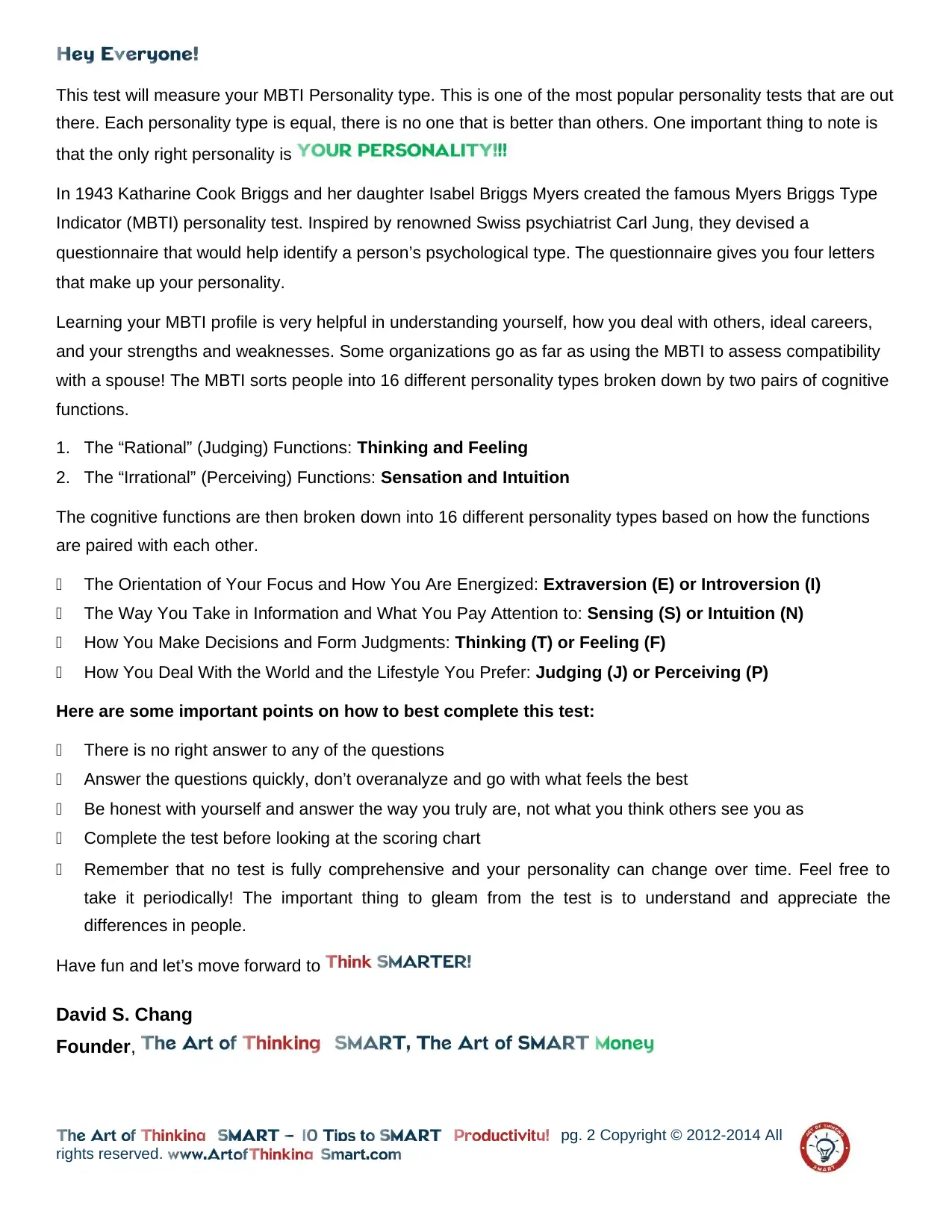
This test will measure your MBTI Personality type. This is one of the most popular personality tests that are out
there. Each personality type is equal, there is no one that is better than others. One important thing to note is
that the only right personality is
In 1943 Katharine Cook Briggs and her daughter Isabel Briggs Myers created the famous Myers Briggs Type
Indicator (MBTI) personality test. Inspired by renowned Swiss psychiatrist Carl Jung, they devised a
questionnaire that would help identify a person’s psychological type. The questionnaire gives you four letters
that make up your personality.
Learning your MBTI profile is very helpful in understanding yourself, how you deal with others, ideal careers,
and your strengths and weaknesses. Some organizations go as far as using the MBTI to assess compatibility
with a spouse! The MBTI sorts people into 16 different personality types broken down by two pairs of cognitive
functions.
1. The “Rational” (Judging) Functions: Thinking and Feeling
2. The “Irrational” (Perceiving) Functions: Sensation and Intuition
The cognitive functions are then broken down into 16 different personality types based on how the functions
are paired with each other.
The Orientation of Your Focus and How You Are Energized: Extraversion (E) or Introversion (I)
The Way You Take in Information and What You Pay Attention to: Sensing (S) or Intuition (N)
How You Make Decisions and Form Judgments: Thinking (T) or Feeling (F)
How You Deal With the World and the Lifestyle You Prefer: Judging (J) or Perceiving (P)
Here are some important points on how to best complete this test:
There is no right answer to any of the questions
Answer the questions quickly, don’t overanalyze and go with what feels the best
Be honest with yourself and answer the way you truly are, not what you think others see you as
Complete the test before looking at the scoring chart
Remember that no test is fully comprehensive and your personality can change over time. Feel free to
take it periodically! The important thing to gleam from the test is to understand and appreciate the
differences in people.
Have fun and let’s move forward to
David S. Chang
Founder,
pg. 2 Copyright © 2012-2014 All
rights reserved.
there. Each personality type is equal, there is no one that is better than others. One important thing to note is
that the only right personality is
In 1943 Katharine Cook Briggs and her daughter Isabel Briggs Myers created the famous Myers Briggs Type
Indicator (MBTI) personality test. Inspired by renowned Swiss psychiatrist Carl Jung, they devised a
questionnaire that would help identify a person’s psychological type. The questionnaire gives you four letters
that make up your personality.
Learning your MBTI profile is very helpful in understanding yourself, how you deal with others, ideal careers,
and your strengths and weaknesses. Some organizations go as far as using the MBTI to assess compatibility
with a spouse! The MBTI sorts people into 16 different personality types broken down by two pairs of cognitive
functions.
1. The “Rational” (Judging) Functions: Thinking and Feeling
2. The “Irrational” (Perceiving) Functions: Sensation and Intuition
The cognitive functions are then broken down into 16 different personality types based on how the functions
are paired with each other.
The Orientation of Your Focus and How You Are Energized: Extraversion (E) or Introversion (I)
The Way You Take in Information and What You Pay Attention to: Sensing (S) or Intuition (N)
How You Make Decisions and Form Judgments: Thinking (T) or Feeling (F)
How You Deal With the World and the Lifestyle You Prefer: Judging (J) or Perceiving (P)
Here are some important points on how to best complete this test:
There is no right answer to any of the questions
Answer the questions quickly, don’t overanalyze and go with what feels the best
Be honest with yourself and answer the way you truly are, not what you think others see you as
Complete the test before looking at the scoring chart
Remember that no test is fully comprehensive and your personality can change over time. Feel free to
take it periodically! The important thing to gleam from the test is to understand and appreciate the
differences in people.
Have fun and let’s move forward to
David S. Chang
Founder,
pg. 2 Copyright © 2012-2014 All
rights reserved.
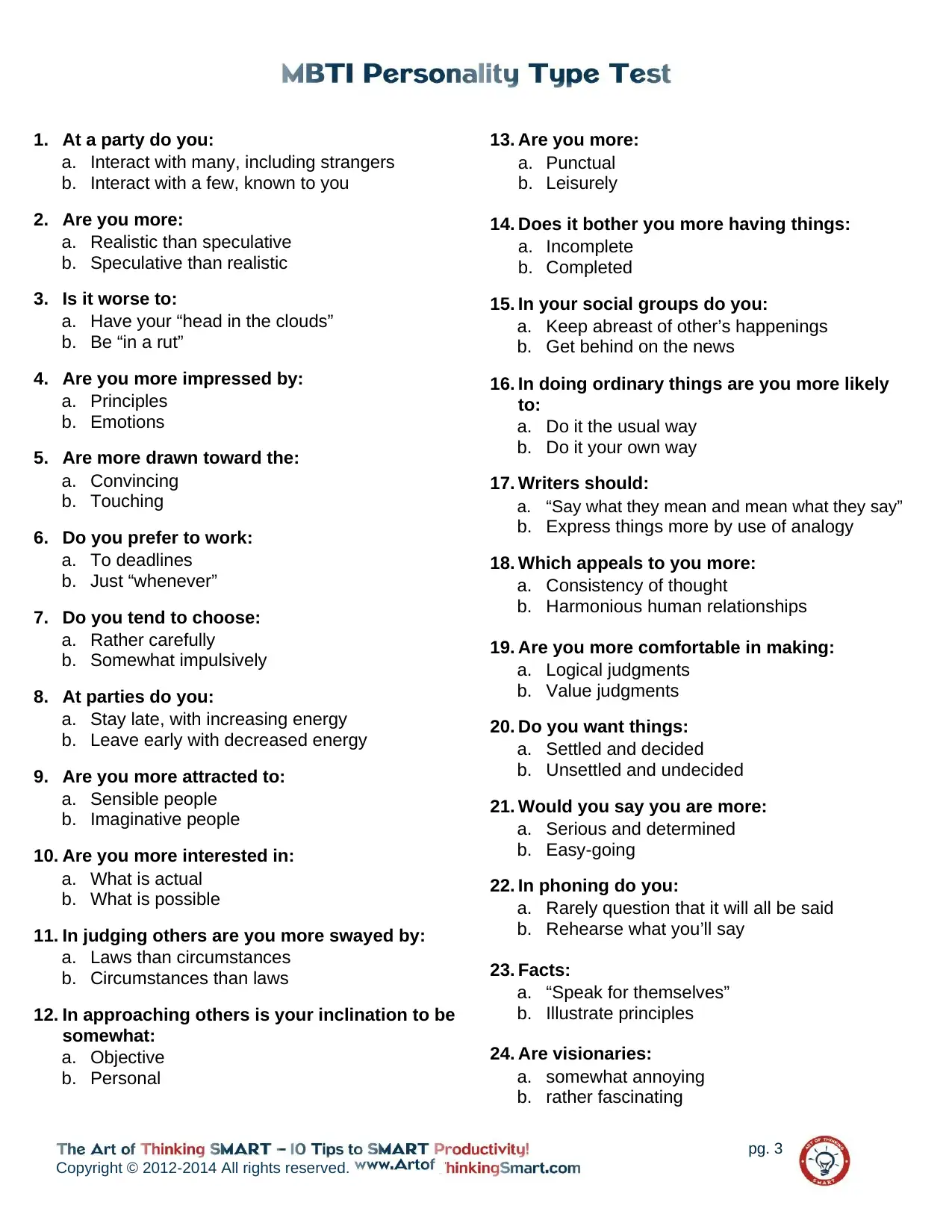
1. At a party do you:
a. Interact with many, including strangers
b. Interact with a few, known to you
2. Are you more:
a. Realistic than speculative
b. Speculative than realistic
3. Is it worse to:
a. Have your “head in the clouds”
b. Be “in a rut”
4. Are you more impressed by:
a. Principles
b. Emotions
5. Are more drawn toward the:
a. Convincing
b. Touching
6. Do you prefer to work:
a. To deadlines
b. Just “whenever”
7. Do you tend to choose:
a. Rather carefully
b. Somewhat impulsively
8. At parties do you:
a. Stay late, with increasing energy
b. Leave early with decreased energy
9. Are you more attracted to:
a. Sensible people
b. Imaginative people
10. Are you more interested in:
a. What is actual
b. What is possible
11. In judging others are you more swayed by:
a. Laws than circumstances
b. Circumstances than laws
12. In approaching others is your inclination to be
somewhat:
a. Objective
b. Personal
Copyright © 2012-2014 All rights reserved.
13. Are you more:
a. Punctual
b. Leisurely
14. Does it bother you more having things:
a. Incomplete
b. Completed
15. In your social groups do you:
a. Keep abreast of other’s happenings
b. Get behind on the news
16. In doing ordinary things are you more likely
to:
a. Do it the usual way
b. Do it your own way
17. Writers should:
a. “Say what they mean and mean what they say”
b. Express things more by use of analogy
18. Which appeals to you more:
a. Consistency of thought
b. Harmonious human relationships
19. Are you more comfortable in making:
a. Logical judgments
b. Value judgments
20. Do you want things:
a. Settled and decided
b. Unsettled and undecided
21. Would you say you are more:
a. Serious and determined
b. Easy-going
22. In phoning do you:
a. Rarely question that it will all be said
b. Rehearse what you’ll say
23. Facts:
a. “Speak for themselves”
b. Illustrate principles
24. Are visionaries:
a. somewhat annoying
b. rather fascinating
pg. 3
a. Interact with many, including strangers
b. Interact with a few, known to you
2. Are you more:
a. Realistic than speculative
b. Speculative than realistic
3. Is it worse to:
a. Have your “head in the clouds”
b. Be “in a rut”
4. Are you more impressed by:
a. Principles
b. Emotions
5. Are more drawn toward the:
a. Convincing
b. Touching
6. Do you prefer to work:
a. To deadlines
b. Just “whenever”
7. Do you tend to choose:
a. Rather carefully
b. Somewhat impulsively
8. At parties do you:
a. Stay late, with increasing energy
b. Leave early with decreased energy
9. Are you more attracted to:
a. Sensible people
b. Imaginative people
10. Are you more interested in:
a. What is actual
b. What is possible
11. In judging others are you more swayed by:
a. Laws than circumstances
b. Circumstances than laws
12. In approaching others is your inclination to be
somewhat:
a. Objective
b. Personal
Copyright © 2012-2014 All rights reserved.
13. Are you more:
a. Punctual
b. Leisurely
14. Does it bother you more having things:
a. Incomplete
b. Completed
15. In your social groups do you:
a. Keep abreast of other’s happenings
b. Get behind on the news
16. In doing ordinary things are you more likely
to:
a. Do it the usual way
b. Do it your own way
17. Writers should:
a. “Say what they mean and mean what they say”
b. Express things more by use of analogy
18. Which appeals to you more:
a. Consistency of thought
b. Harmonious human relationships
19. Are you more comfortable in making:
a. Logical judgments
b. Value judgments
20. Do you want things:
a. Settled and decided
b. Unsettled and undecided
21. Would you say you are more:
a. Serious and determined
b. Easy-going
22. In phoning do you:
a. Rarely question that it will all be said
b. Rehearse what you’ll say
23. Facts:
a. “Speak for themselves”
b. Illustrate principles
24. Are visionaries:
a. somewhat annoying
b. rather fascinating
pg. 3
⊘ This is a preview!⊘
Do you want full access?
Subscribe today to unlock all pages.

Trusted by 1+ million students worldwide
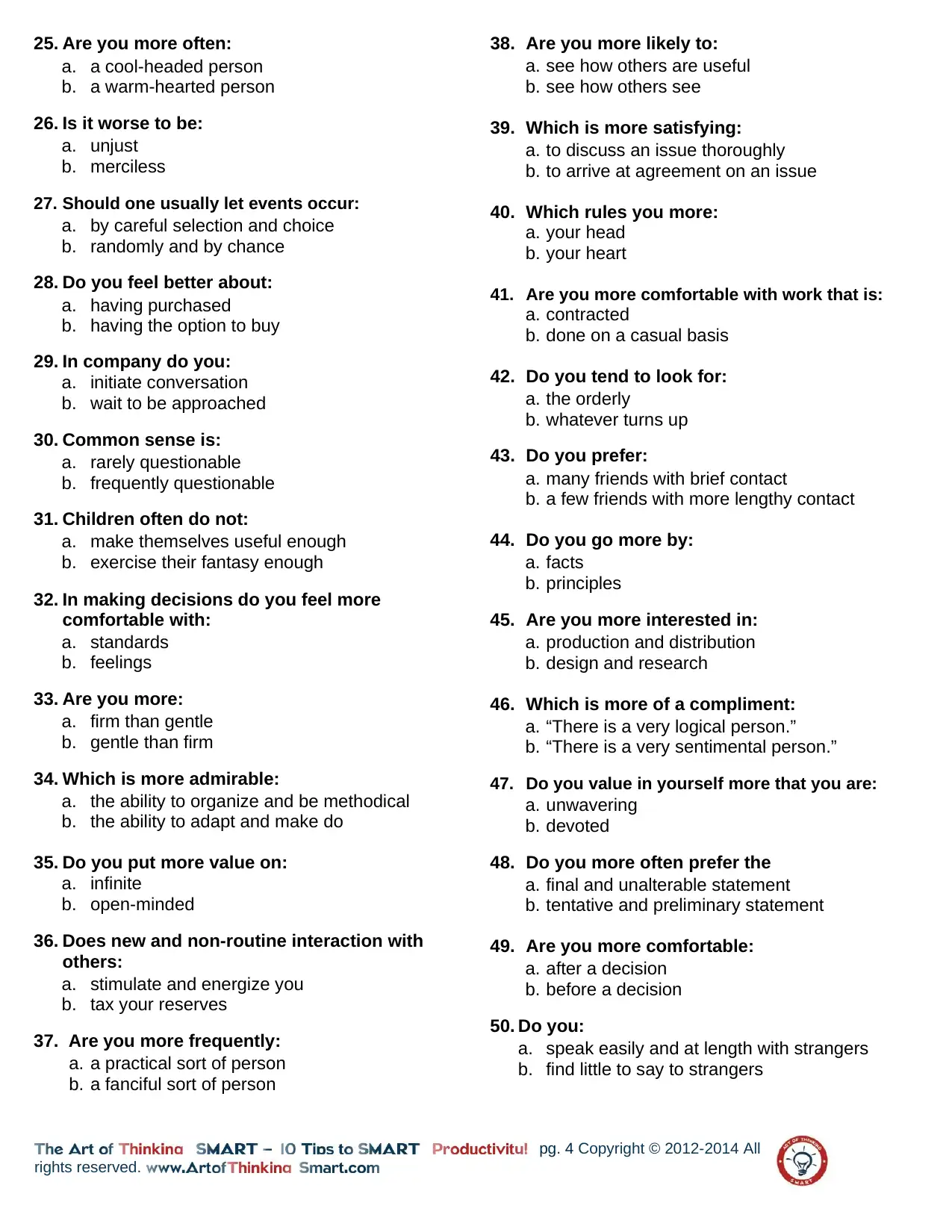
25. Are you more often:
a. a cool-headed person
b. a warm-hearted person
26. Is it worse to be:
a. unjust
b. merciless
27. Should one usually let events occur:
a. by careful selection and choice
b. randomly and by chance
28. Do you feel better about:
a. having purchased
b. having the option to buy
29. In company do you:
a. initiate conversation
b. wait to be approached
30. Common sense is:
a. rarely questionable
b. frequently questionable
31. Children often do not:
38. Are you more likely to:
a. see how others are useful
b. see how others see
39. Which is more satisfying:
a. to discuss an issue thoroughly
b. to arrive at agreement on an issue
40. Which rules you more:
a. your head
b. your heart
41. Are you more comfortable with work that is:
a. contracted
b. done on a casual basis
42. Do you tend to look for:
a. the orderly
b. whatever turns up
43. Do you prefer:
a. many friends with brief contact
b. a few friends with more lengthy contact
a. make themselves useful enough
b. exercise their fantasy enough
32. In making decisions do you feel more
comfortable with:
a. standards
b. feelings
33. Are you more:
a. firm than gentle
b. gentle than firm
34. Which is more admirable:
a. the ability to organize and be methodical
b. the ability to adapt and make do
35. Do you put more value on:
a. infinite
b. open-minded
36. Does new and non-routine interaction with
others:
a. stimulate and energize you
b. tax your reserves
37. Are you more frequently:
a. a practical sort of person
b. a fanciful sort of person
44. Do you go more by:
a. facts
b. principles
45. Are you more interested in:
a. production and distribution
b. design and research
46. Which is more of a compliment:
a. “There is a very logical person.”
b. “There is a very sentimental person.”
47. Do you value in yourself more that you are:
a. unwavering
b. devoted
48. Do you more often prefer the
a. final and unalterable statement
b. tentative and preliminary statement
49. Are you more comfortable:
a. after a decision
b. before a decision
50. Do you:
a. speak easily and at length with strangers
b. find little to say to strangers
pg. 4 Copyright © 2012-2014 All
rights reserved.
a. a cool-headed person
b. a warm-hearted person
26. Is it worse to be:
a. unjust
b. merciless
27. Should one usually let events occur:
a. by careful selection and choice
b. randomly and by chance
28. Do you feel better about:
a. having purchased
b. having the option to buy
29. In company do you:
a. initiate conversation
b. wait to be approached
30. Common sense is:
a. rarely questionable
b. frequently questionable
31. Children often do not:
38. Are you more likely to:
a. see how others are useful
b. see how others see
39. Which is more satisfying:
a. to discuss an issue thoroughly
b. to arrive at agreement on an issue
40. Which rules you more:
a. your head
b. your heart
41. Are you more comfortable with work that is:
a. contracted
b. done on a casual basis
42. Do you tend to look for:
a. the orderly
b. whatever turns up
43. Do you prefer:
a. many friends with brief contact
b. a few friends with more lengthy contact
a. make themselves useful enough
b. exercise their fantasy enough
32. In making decisions do you feel more
comfortable with:
a. standards
b. feelings
33. Are you more:
a. firm than gentle
b. gentle than firm
34. Which is more admirable:
a. the ability to organize and be methodical
b. the ability to adapt and make do
35. Do you put more value on:
a. infinite
b. open-minded
36. Does new and non-routine interaction with
others:
a. stimulate and energize you
b. tax your reserves
37. Are you more frequently:
a. a practical sort of person
b. a fanciful sort of person
44. Do you go more by:
a. facts
b. principles
45. Are you more interested in:
a. production and distribution
b. design and research
46. Which is more of a compliment:
a. “There is a very logical person.”
b. “There is a very sentimental person.”
47. Do you value in yourself more that you are:
a. unwavering
b. devoted
48. Do you more often prefer the
a. final and unalterable statement
b. tentative and preliminary statement
49. Are you more comfortable:
a. after a decision
b. before a decision
50. Do you:
a. speak easily and at length with strangers
b. find little to say to strangers
pg. 4 Copyright © 2012-2014 All
rights reserved.
Paraphrase This Document
Need a fresh take? Get an instant paraphrase of this document with our AI Paraphraser
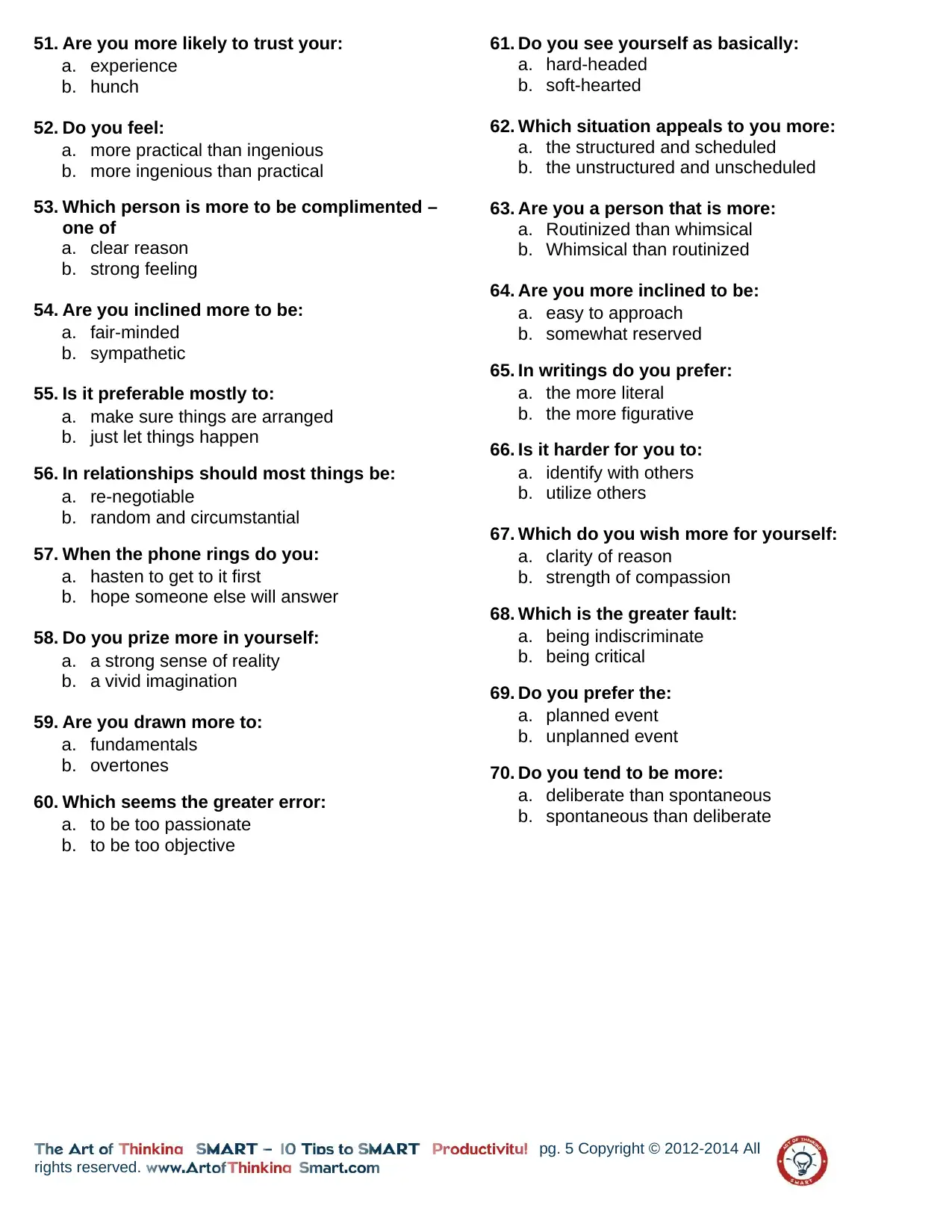
51. Are you more likely to trust your:
a. experience
b. hunch
52. Do you feel:
a. more practical than ingenious
b. more ingenious than practical
53. Which person is more to be complimented –
one of
a. clear reason
b. strong feeling
54. Are you inclined more to be:
a. fair-minded
b. sympathetic
55. Is it preferable mostly to:
a. make sure things are arranged
b. just let things happen
56. In relationships should most things be:
a. re-negotiable
b. random and circumstantial
57. When the phone rings do you:
a. hasten to get to it first
b. hope someone else will answer
58. Do you prize more in yourself:
a. a strong sense of reality
b. a vivid imagination
59. Are you drawn more to:
a. fundamentals
b. overtones
60. Which seems the greater error:
a. to be too passionate
b. to be too objective
61. Do you see yourself as basically:
a. hard-headed
b. soft-hearted
62. Which situation appeals to you more:
a. the structured and scheduled
b. the unstructured and unscheduled
63. Are you a person that is more:
a. Routinized than whimsical
b. Whimsical than routinized
64. Are you more inclined to be:
a. easy to approach
b. somewhat reserved
65. In writings do you prefer:
a. the more literal
b. the more figurative
66. Is it harder for you to:
a. identify with others
b. utilize others
67. Which do you wish more for yourself:
a. clarity of reason
b. strength of compassion
68. Which is the greater fault:
a. being indiscriminate
b. being critical
69. Do you prefer the:
a. planned event
b. unplanned event
70. Do you tend to be more:
a. deliberate than spontaneous
b. spontaneous than deliberate
pg. 5 Copyright © 2012-2014 All
rights reserved.
a. experience
b. hunch
52. Do you feel:
a. more practical than ingenious
b. more ingenious than practical
53. Which person is more to be complimented –
one of
a. clear reason
b. strong feeling
54. Are you inclined more to be:
a. fair-minded
b. sympathetic
55. Is it preferable mostly to:
a. make sure things are arranged
b. just let things happen
56. In relationships should most things be:
a. re-negotiable
b. random and circumstantial
57. When the phone rings do you:
a. hasten to get to it first
b. hope someone else will answer
58. Do you prize more in yourself:
a. a strong sense of reality
b. a vivid imagination
59. Are you drawn more to:
a. fundamentals
b. overtones
60. Which seems the greater error:
a. to be too passionate
b. to be too objective
61. Do you see yourself as basically:
a. hard-headed
b. soft-hearted
62. Which situation appeals to you more:
a. the structured and scheduled
b. the unstructured and unscheduled
63. Are you a person that is more:
a. Routinized than whimsical
b. Whimsical than routinized
64. Are you more inclined to be:
a. easy to approach
b. somewhat reserved
65. In writings do you prefer:
a. the more literal
b. the more figurative
66. Is it harder for you to:
a. identify with others
b. utilize others
67. Which do you wish more for yourself:
a. clarity of reason
b. strength of compassion
68. Which is the greater fault:
a. being indiscriminate
b. being critical
69. Do you prefer the:
a. planned event
b. unplanned event
70. Do you tend to be more:
a. deliberate than spontaneous
b. spontaneous than deliberate
pg. 5 Copyright © 2012-2014 All
rights reserved.
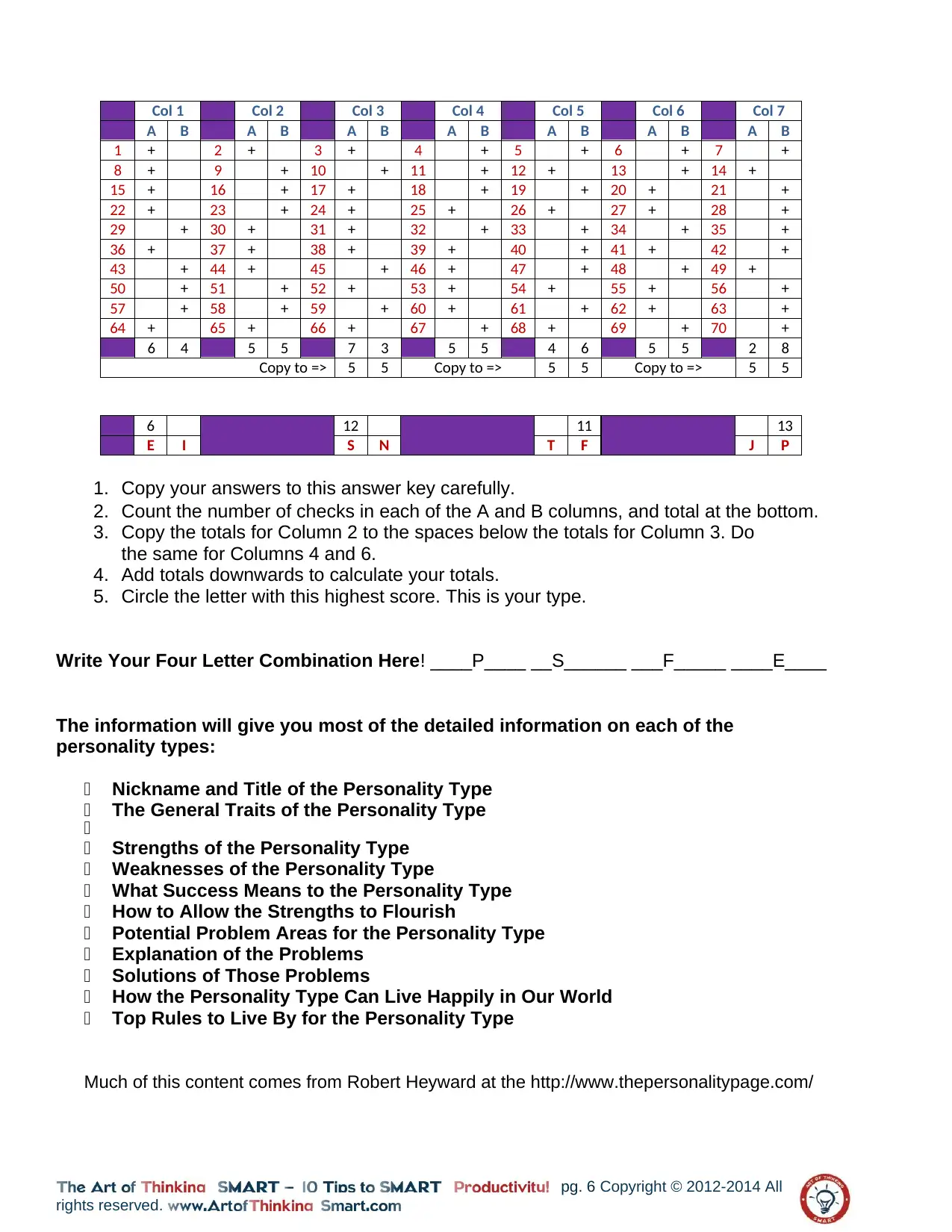
Col 1 Col 2 Col 3 Col 4 Col 5 Col 6 Col 7
A B A B A B A B A B A B A B
1 + 2 + 3 + 4 + 5 + 6 + 7 +
8 + 9 + 10 + 11 + 12 + 13 + 14 +
15 + 16 + 17 + 18 + 19 + 20 + 21 +
22 + 23 + 24 + 25 + 26 + 27 + 28 +
29 + 30 + 31 + 32 + 33 + 34 + 35 +
36 + 37 + 38 + 39 + 40 + 41 + 42 +
43 + 44 + 45 + 46 + 47 + 48 + 49 +
50 + 51 + 52 + 53 + 54 + 55 + 56 +
57 + 58 + 59 + 60 + 61 + 62 + 63 +
64 + 65 + 66 + 67 + 68 + 69 + 70 +
6 4 5 5 7 3 5 5 4 6 5 5 2 8
Copy to => 5 5 Copy to => 5 5 Copy to => 5 5
6 12 11 13
E I S N T F J P
1. Copy your answers to this answer key carefully.
2. Count the number of checks in each of the A and B columns, and total at the bottom.
3. Copy the totals for Column 2 to the spaces below the totals for Column 3. Do
the same for Columns 4 and 6.
4. Add totals downwards to calculate your totals.
5. Circle the letter with this highest score. This is your type.
Write Your Four Letter Combination Here! ____P____ __S______ ___F_____ ____E____
The information will give you most of the detailed information on each of the
personality types:
Nickname and Title of the Personality Type
The General Traits of the Personality Type
Strengths of the Personality Type
Weaknesses of the Personality Type
What Success Means to the Personality Type
How to Allow the Strengths to Flourish
Potential Problem Areas for the Personality Type
Explanation of the Problems
Solutions of Those Problems
How the Personality Type Can Live Happily in Our World
Top Rules to Live By for the Personality Type
Much of this content comes from Robert Heyward at the http://www.thepersonalitypage.com/
pg. 6 Copyright © 2012-2014 All
rights reserved.
A B A B A B A B A B A B A B
1 + 2 + 3 + 4 + 5 + 6 + 7 +
8 + 9 + 10 + 11 + 12 + 13 + 14 +
15 + 16 + 17 + 18 + 19 + 20 + 21 +
22 + 23 + 24 + 25 + 26 + 27 + 28 +
29 + 30 + 31 + 32 + 33 + 34 + 35 +
36 + 37 + 38 + 39 + 40 + 41 + 42 +
43 + 44 + 45 + 46 + 47 + 48 + 49 +
50 + 51 + 52 + 53 + 54 + 55 + 56 +
57 + 58 + 59 + 60 + 61 + 62 + 63 +
64 + 65 + 66 + 67 + 68 + 69 + 70 +
6 4 5 5 7 3 5 5 4 6 5 5 2 8
Copy to => 5 5 Copy to => 5 5 Copy to => 5 5
6 12 11 13
E I S N T F J P
1. Copy your answers to this answer key carefully.
2. Count the number of checks in each of the A and B columns, and total at the bottom.
3. Copy the totals for Column 2 to the spaces below the totals for Column 3. Do
the same for Columns 4 and 6.
4. Add totals downwards to calculate your totals.
5. Circle the letter with this highest score. This is your type.
Write Your Four Letter Combination Here! ____P____ __S______ ___F_____ ____E____
The information will give you most of the detailed information on each of the
personality types:
Nickname and Title of the Personality Type
The General Traits of the Personality Type
Strengths of the Personality Type
Weaknesses of the Personality Type
What Success Means to the Personality Type
How to Allow the Strengths to Flourish
Potential Problem Areas for the Personality Type
Explanation of the Problems
Solutions of Those Problems
How the Personality Type Can Live Happily in Our World
Top Rules to Live By for the Personality Type
Much of this content comes from Robert Heyward at the http://www.thepersonalitypage.com/
pg. 6 Copyright © 2012-2014 All
rights reserved.
⊘ This is a preview!⊘
Do you want full access?
Subscribe today to unlock all pages.

Trusted by 1+ million students worldwide
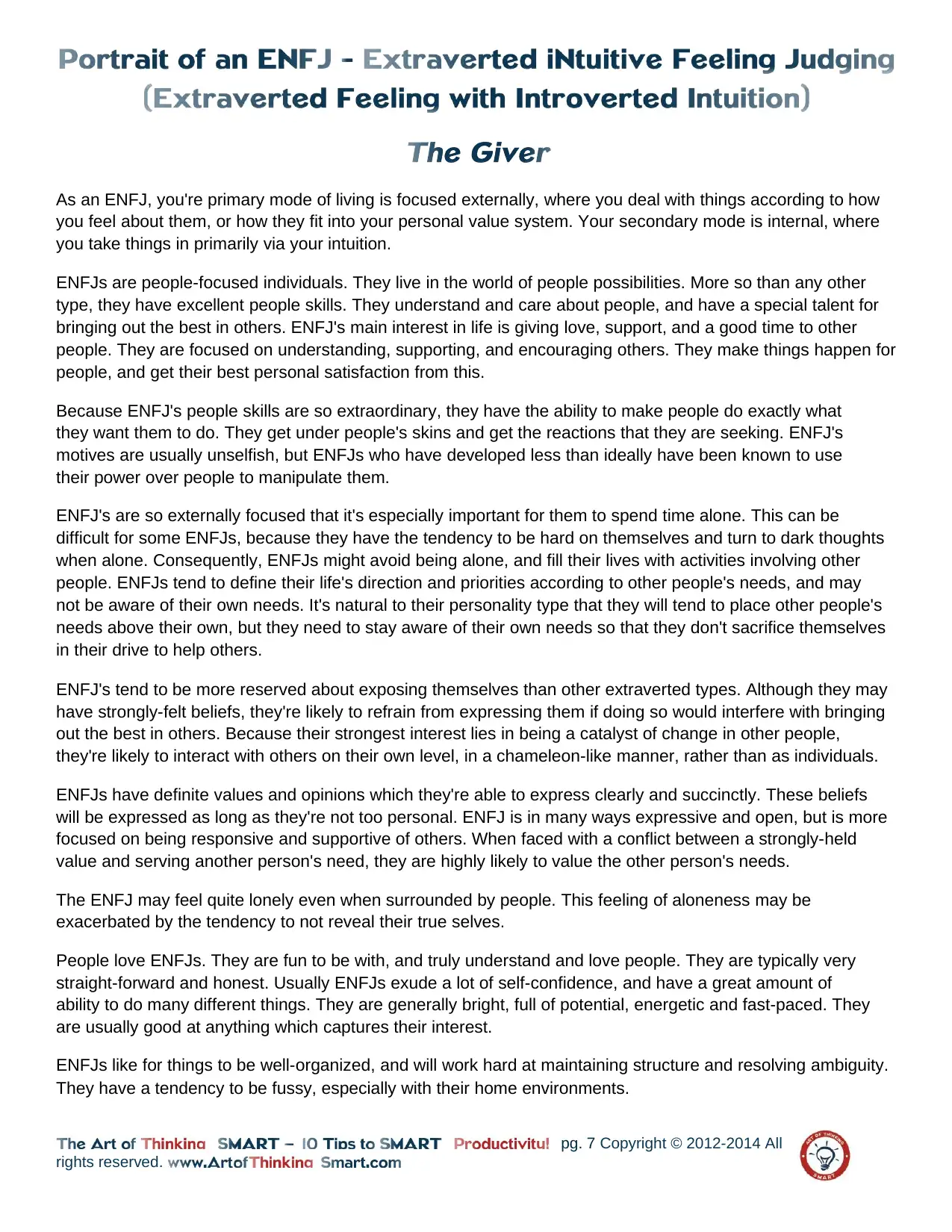
As an ENFJ, you're primary mode of living is focused externally, where you deal with things according to how
you feel about them, or how they fit into your personal value system. Your secondary mode is internal, where
you take things in primarily via your intuition.
ENFJs are people-focused individuals. They live in the world of people possibilities. More so than any other
type, they have excellent people skills. They understand and care about people, and have a special talent for
bringing out the best in others. ENFJ's main interest in life is giving love, support, and a good time to other
people. They are focused on understanding, supporting, and encouraging others. They make things happen for
people, and get their best personal satisfaction from this.
Because ENFJ's people skills are so extraordinary, they have the ability to make people do exactly what
they want them to do. They get under people's skins and get the reactions that they are seeking. ENFJ's
motives are usually unselfish, but ENFJs who have developed less than ideally have been known to use
their power over people to manipulate them.
ENFJ's are so externally focused that it's especially important for them to spend time alone. This can be
difficult for some ENFJs, because they have the tendency to be hard on themselves and turn to dark thoughts
when alone. Consequently, ENFJs might avoid being alone, and fill their lives with activities involving other
people. ENFJs tend to define their life's direction and priorities according to other people's needs, and may
not be aware of their own needs. It's natural to their personality type that they will tend to place other people's
needs above their own, but they need to stay aware of their own needs so that they don't sacrifice themselves
in their drive to help others.
ENFJ's tend to be more reserved about exposing themselves than other extraverted types. Although they may
have strongly-felt beliefs, they're likely to refrain from expressing them if doing so would interfere with bringing
out the best in others. Because their strongest interest lies in being a catalyst of change in other people,
they're likely to interact with others on their own level, in a chameleon-like manner, rather than as individuals.
ENFJs have definite values and opinions which they're able to express clearly and succinctly. These beliefs
will be expressed as long as they're not too personal. ENFJ is in many ways expressive and open, but is more
focused on being responsive and supportive of others. When faced with a conflict between a strongly-held
value and serving another person's need, they are highly likely to value the other person's needs.
The ENFJ may feel quite lonely even when surrounded by people. This feeling of aloneness may be
exacerbated by the tendency to not reveal their true selves.
People love ENFJs. They are fun to be with, and truly understand and love people. They are typically very
straight-forward and honest. Usually ENFJs exude a lot of self-confidence, and have a great amount of
ability to do many different things. They are generally bright, full of potential, energetic and fast-paced. They
are usually good at anything which captures their interest.
ENFJs like for things to be well-organized, and will work hard at maintaining structure and resolving ambiguity.
They have a tendency to be fussy, especially with their home environments.
pg. 7 Copyright © 2012-2014 All
rights reserved.
you feel about them, or how they fit into your personal value system. Your secondary mode is internal, where
you take things in primarily via your intuition.
ENFJs are people-focused individuals. They live in the world of people possibilities. More so than any other
type, they have excellent people skills. They understand and care about people, and have a special talent for
bringing out the best in others. ENFJ's main interest in life is giving love, support, and a good time to other
people. They are focused on understanding, supporting, and encouraging others. They make things happen for
people, and get their best personal satisfaction from this.
Because ENFJ's people skills are so extraordinary, they have the ability to make people do exactly what
they want them to do. They get under people's skins and get the reactions that they are seeking. ENFJ's
motives are usually unselfish, but ENFJs who have developed less than ideally have been known to use
their power over people to manipulate them.
ENFJ's are so externally focused that it's especially important for them to spend time alone. This can be
difficult for some ENFJs, because they have the tendency to be hard on themselves and turn to dark thoughts
when alone. Consequently, ENFJs might avoid being alone, and fill their lives with activities involving other
people. ENFJs tend to define their life's direction and priorities according to other people's needs, and may
not be aware of their own needs. It's natural to their personality type that they will tend to place other people's
needs above their own, but they need to stay aware of their own needs so that they don't sacrifice themselves
in their drive to help others.
ENFJ's tend to be more reserved about exposing themselves than other extraverted types. Although they may
have strongly-felt beliefs, they're likely to refrain from expressing them if doing so would interfere with bringing
out the best in others. Because their strongest interest lies in being a catalyst of change in other people,
they're likely to interact with others on their own level, in a chameleon-like manner, rather than as individuals.
ENFJs have definite values and opinions which they're able to express clearly and succinctly. These beliefs
will be expressed as long as they're not too personal. ENFJ is in many ways expressive and open, but is more
focused on being responsive and supportive of others. When faced with a conflict between a strongly-held
value and serving another person's need, they are highly likely to value the other person's needs.
The ENFJ may feel quite lonely even when surrounded by people. This feeling of aloneness may be
exacerbated by the tendency to not reveal their true selves.
People love ENFJs. They are fun to be with, and truly understand and love people. They are typically very
straight-forward and honest. Usually ENFJs exude a lot of self-confidence, and have a great amount of
ability to do many different things. They are generally bright, full of potential, energetic and fast-paced. They
are usually good at anything which captures their interest.
ENFJs like for things to be well-organized, and will work hard at maintaining structure and resolving ambiguity.
They have a tendency to be fussy, especially with their home environments.
pg. 7 Copyright © 2012-2014 All
rights reserved.
Paraphrase This Document
Need a fresh take? Get an instant paraphrase of this document with our AI Paraphraser
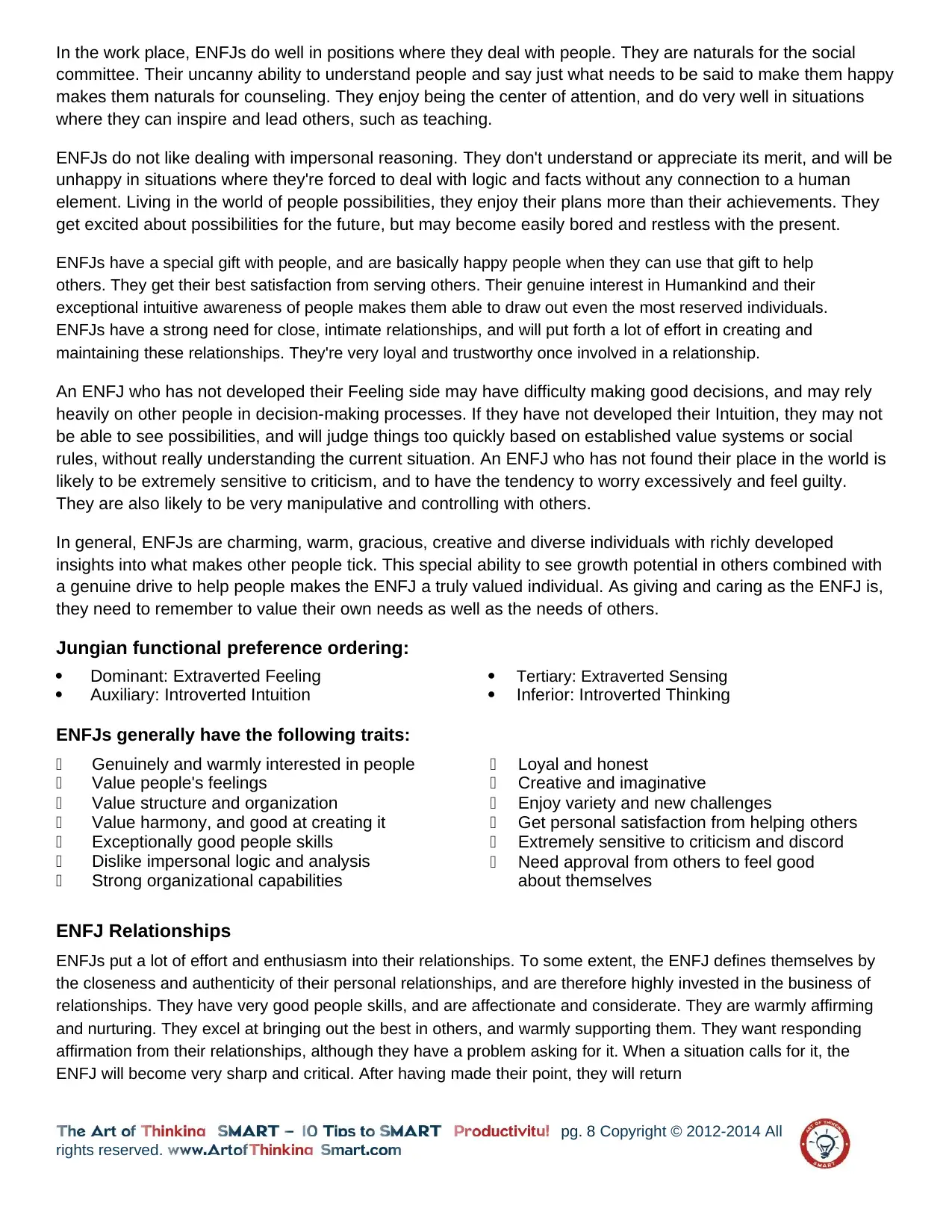
In the work place, ENFJs do well in positions where they deal with people. They are naturals for the social
committee. Their uncanny ability to understand people and say just what needs to be said to make them happy
makes them naturals for counseling. They enjoy being the center of attention, and do very well in situations
where they can inspire and lead others, such as teaching.
ENFJs do not like dealing with impersonal reasoning. They don't understand or appreciate its merit, and will be
unhappy in situations where they're forced to deal with logic and facts without any connection to a human
element. Living in the world of people possibilities, they enjoy their plans more than their achievements. They
get excited about possibilities for the future, but may become easily bored and restless with the present.
ENFJs have a special gift with people, and are basically happy people when they can use that gift to help
others. They get their best satisfaction from serving others. Their genuine interest in Humankind and their
exceptional intuitive awareness of people makes them able to draw out even the most reserved individuals.
ENFJs have a strong need for close, intimate relationships, and will put forth a lot of effort in creating and
maintaining these relationships. They're very loyal and trustworthy once involved in a relationship.
An ENFJ who has not developed their Feeling side may have difficulty making good decisions, and may rely
heavily on other people in decision-making processes. If they have not developed their Intuition, they may not
be able to see possibilities, and will judge things too quickly based on established value systems or social
rules, without really understanding the current situation. An ENFJ who has not found their place in the world is
likely to be extremely sensitive to criticism, and to have the tendency to worry excessively and feel guilty.
They are also likely to be very manipulative and controlling with others.
In general, ENFJs are charming, warm, gracious, creative and diverse individuals with richly developed
insights into what makes other people tick. This special ability to see growth potential in others combined with
a genuine drive to help people makes the ENFJ a truly valued individual. As giving and caring as the ENFJ is,
they need to remember to value their own needs as well as the needs of others.
Jungian functional preference ordering:
Dominant: Extraverted Feeling Tertiary: Extraverted Sensing
Auxiliary: Introverted Intuition Inferior: Introverted Thinking
ENFJs generally have the following traits:
Genuinely and warmly interested in people
Value people's feelings
Value structure and organization
Value harmony, and good at creating it
Exceptionally good people skills
Dislike impersonal logic and analysis
Strong organizational capabilities
Loyal and honest
Creative and imaginative
Enjoy variety and new challenges
Get personal satisfaction from helping others
Extremely sensitive to criticism and discord
Need approval from others to feel good
about themselves
ENFJ Relationships
ENFJs put a lot of effort and enthusiasm into their relationships. To some extent, the ENFJ defines themselves by
the closeness and authenticity of their personal relationships, and are therefore highly invested in the business of
relationships. They have very good people skills, and are affectionate and considerate. They are warmly affirming
and nurturing. They excel at bringing out the best in others, and warmly supporting them. They want responding
affirmation from their relationships, although they have a problem asking for it. When a situation calls for it, the
ENFJ will become very sharp and critical. After having made their point, they will return
pg. 8 Copyright © 2012-2014 All
rights reserved.
committee. Their uncanny ability to understand people and say just what needs to be said to make them happy
makes them naturals for counseling. They enjoy being the center of attention, and do very well in situations
where they can inspire and lead others, such as teaching.
ENFJs do not like dealing with impersonal reasoning. They don't understand or appreciate its merit, and will be
unhappy in situations where they're forced to deal with logic and facts without any connection to a human
element. Living in the world of people possibilities, they enjoy their plans more than their achievements. They
get excited about possibilities for the future, but may become easily bored and restless with the present.
ENFJs have a special gift with people, and are basically happy people when they can use that gift to help
others. They get their best satisfaction from serving others. Their genuine interest in Humankind and their
exceptional intuitive awareness of people makes them able to draw out even the most reserved individuals.
ENFJs have a strong need for close, intimate relationships, and will put forth a lot of effort in creating and
maintaining these relationships. They're very loyal and trustworthy once involved in a relationship.
An ENFJ who has not developed their Feeling side may have difficulty making good decisions, and may rely
heavily on other people in decision-making processes. If they have not developed their Intuition, they may not
be able to see possibilities, and will judge things too quickly based on established value systems or social
rules, without really understanding the current situation. An ENFJ who has not found their place in the world is
likely to be extremely sensitive to criticism, and to have the tendency to worry excessively and feel guilty.
They are also likely to be very manipulative and controlling with others.
In general, ENFJs are charming, warm, gracious, creative and diverse individuals with richly developed
insights into what makes other people tick. This special ability to see growth potential in others combined with
a genuine drive to help people makes the ENFJ a truly valued individual. As giving and caring as the ENFJ is,
they need to remember to value their own needs as well as the needs of others.
Jungian functional preference ordering:
Dominant: Extraverted Feeling Tertiary: Extraverted Sensing
Auxiliary: Introverted Intuition Inferior: Introverted Thinking
ENFJs generally have the following traits:
Genuinely and warmly interested in people
Value people's feelings
Value structure and organization
Value harmony, and good at creating it
Exceptionally good people skills
Dislike impersonal logic and analysis
Strong organizational capabilities
Loyal and honest
Creative and imaginative
Enjoy variety and new challenges
Get personal satisfaction from helping others
Extremely sensitive to criticism and discord
Need approval from others to feel good
about themselves
ENFJ Relationships
ENFJs put a lot of effort and enthusiasm into their relationships. To some extent, the ENFJ defines themselves by
the closeness and authenticity of their personal relationships, and are therefore highly invested in the business of
relationships. They have very good people skills, and are affectionate and considerate. They are warmly affirming
and nurturing. They excel at bringing out the best in others, and warmly supporting them. They want responding
affirmation from their relationships, although they have a problem asking for it. When a situation calls for it, the
ENFJ will become very sharp and critical. After having made their point, they will return
pg. 8 Copyright © 2012-2014 All
rights reserved.
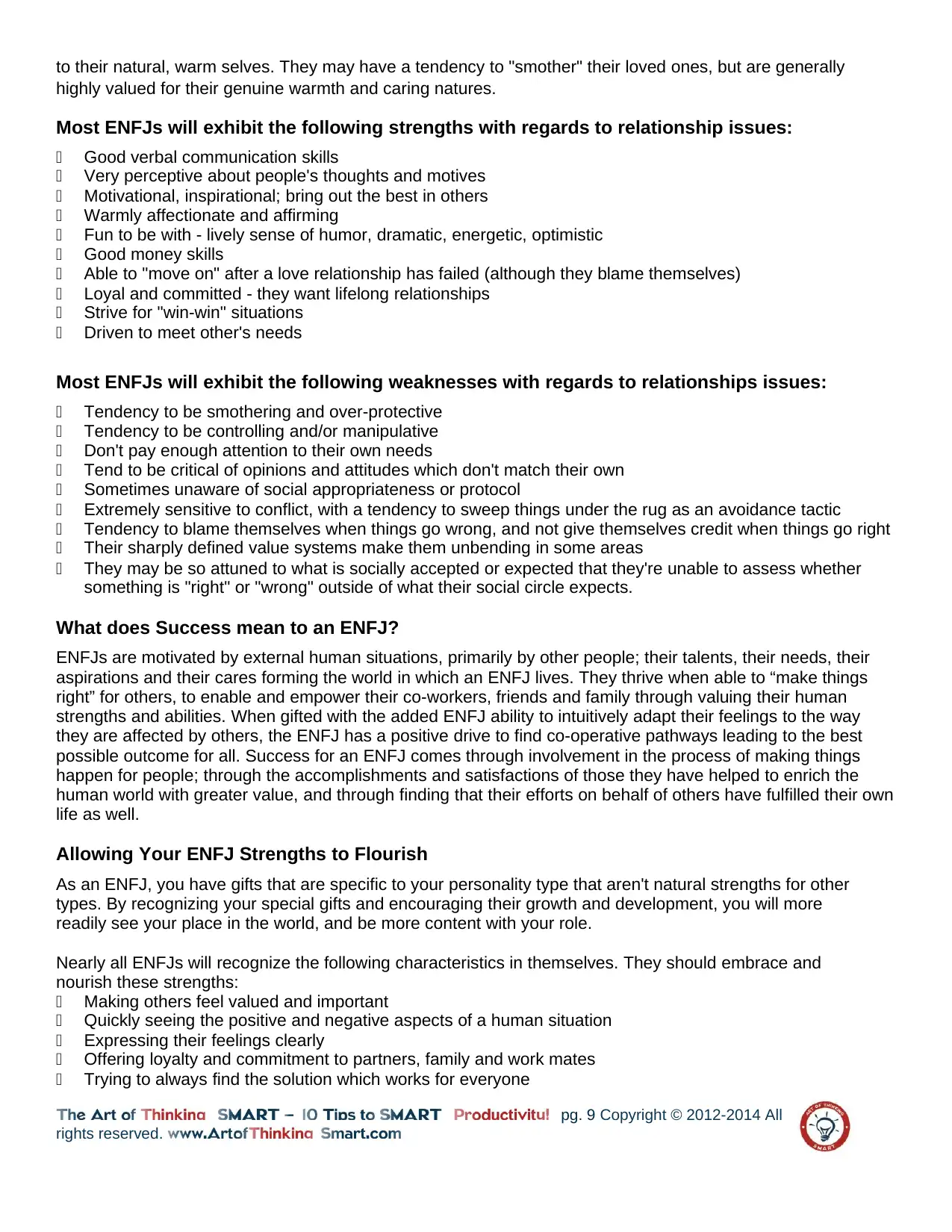
to their natural, warm selves. They may have a tendency to "smother" their loved ones, but are generally
highly valued for their genuine warmth and caring natures.
Most ENFJs will exhibit the following strengths with regards to relationship issues:
Good verbal communication skills
Very perceptive about people's thoughts and motives
Motivational, inspirational; bring out the best in others
Warmly affectionate and affirming
Fun to be with - lively sense of humor, dramatic, energetic, optimistic
Good money skills
Able to "move on" after a love relationship has failed (although they blame themselves)
Loyal and committed - they want lifelong relationships
Strive for "win-win" situations
Driven to meet other's needs
Most ENFJs will exhibit the following weaknesses with regards to relationships issues:
Tendency to be smothering and over-protective
Tendency to be controlling and/or manipulative
Don't pay enough attention to their own needs
Tend to be critical of opinions and attitudes which don't match their own
Sometimes unaware of social appropriateness or protocol
Extremely sensitive to conflict, with a tendency to sweep things under the rug as an avoidance tactic
Tendency to blame themselves when things go wrong, and not give themselves credit when things go right
Their sharply defined value systems make them unbending in some areas
They may be so attuned to what is socially accepted or expected that they're unable to assess whether
something is "right" or "wrong" outside of what their social circle expects.
What does Success mean to an ENFJ?
ENFJs are motivated by external human situations, primarily by other people; their talents, their needs, their
aspirations and their cares forming the world in which an ENFJ lives. They thrive when able to “make things
right” for others, to enable and empower their co-workers, friends and family through valuing their human
strengths and abilities. When gifted with the added ENFJ ability to intuitively adapt their feelings to the way
they are affected by others, the ENFJ has a positive drive to find co-operative pathways leading to the best
possible outcome for all. Success for an ENFJ comes through involvement in the process of making things
happen for people; through the accomplishments and satisfactions of those they have helped to enrich the
human world with greater value, and through finding that their efforts on behalf of others have fulfilled their own
life as well.
Allowing Your ENFJ Strengths to Flourish
As an ENFJ, you have gifts that are specific to your personality type that aren't natural strengths for other
types. By recognizing your special gifts and encouraging their growth and development, you will more
readily see your place in the world, and be more content with your role.
Nearly all ENFJs will recognize the following characteristics in themselves. They should embrace and
nourish these strengths:
Making others feel valued and important
Quickly seeing the positive and negative aspects of a human situation
Expressing their feelings clearly
Offering loyalty and commitment to partners, family and work mates
Trying to always find the solution which works for everyone
pg. 9 Copyright © 2012-2014 All
rights reserved.
highly valued for their genuine warmth and caring natures.
Most ENFJs will exhibit the following strengths with regards to relationship issues:
Good verbal communication skills
Very perceptive about people's thoughts and motives
Motivational, inspirational; bring out the best in others
Warmly affectionate and affirming
Fun to be with - lively sense of humor, dramatic, energetic, optimistic
Good money skills
Able to "move on" after a love relationship has failed (although they blame themselves)
Loyal and committed - they want lifelong relationships
Strive for "win-win" situations
Driven to meet other's needs
Most ENFJs will exhibit the following weaknesses with regards to relationships issues:
Tendency to be smothering and over-protective
Tendency to be controlling and/or manipulative
Don't pay enough attention to their own needs
Tend to be critical of opinions and attitudes which don't match their own
Sometimes unaware of social appropriateness or protocol
Extremely sensitive to conflict, with a tendency to sweep things under the rug as an avoidance tactic
Tendency to blame themselves when things go wrong, and not give themselves credit when things go right
Their sharply defined value systems make them unbending in some areas
They may be so attuned to what is socially accepted or expected that they're unable to assess whether
something is "right" or "wrong" outside of what their social circle expects.
What does Success mean to an ENFJ?
ENFJs are motivated by external human situations, primarily by other people; their talents, their needs, their
aspirations and their cares forming the world in which an ENFJ lives. They thrive when able to “make things
right” for others, to enable and empower their co-workers, friends and family through valuing their human
strengths and abilities. When gifted with the added ENFJ ability to intuitively adapt their feelings to the way
they are affected by others, the ENFJ has a positive drive to find co-operative pathways leading to the best
possible outcome for all. Success for an ENFJ comes through involvement in the process of making things
happen for people; through the accomplishments and satisfactions of those they have helped to enrich the
human world with greater value, and through finding that their efforts on behalf of others have fulfilled their own
life as well.
Allowing Your ENFJ Strengths to Flourish
As an ENFJ, you have gifts that are specific to your personality type that aren't natural strengths for other
types. By recognizing your special gifts and encouraging their growth and development, you will more
readily see your place in the world, and be more content with your role.
Nearly all ENFJs will recognize the following characteristics in themselves. They should embrace and
nourish these strengths:
Making others feel valued and important
Quickly seeing the positive and negative aspects of a human situation
Expressing their feelings clearly
Offering loyalty and commitment to partners, family and work mates
Trying to always find the solution which works for everyone
pg. 9 Copyright © 2012-2014 All
rights reserved.
⊘ This is a preview!⊘
Do you want full access?
Subscribe today to unlock all pages.

Trusted by 1+ million students worldwide
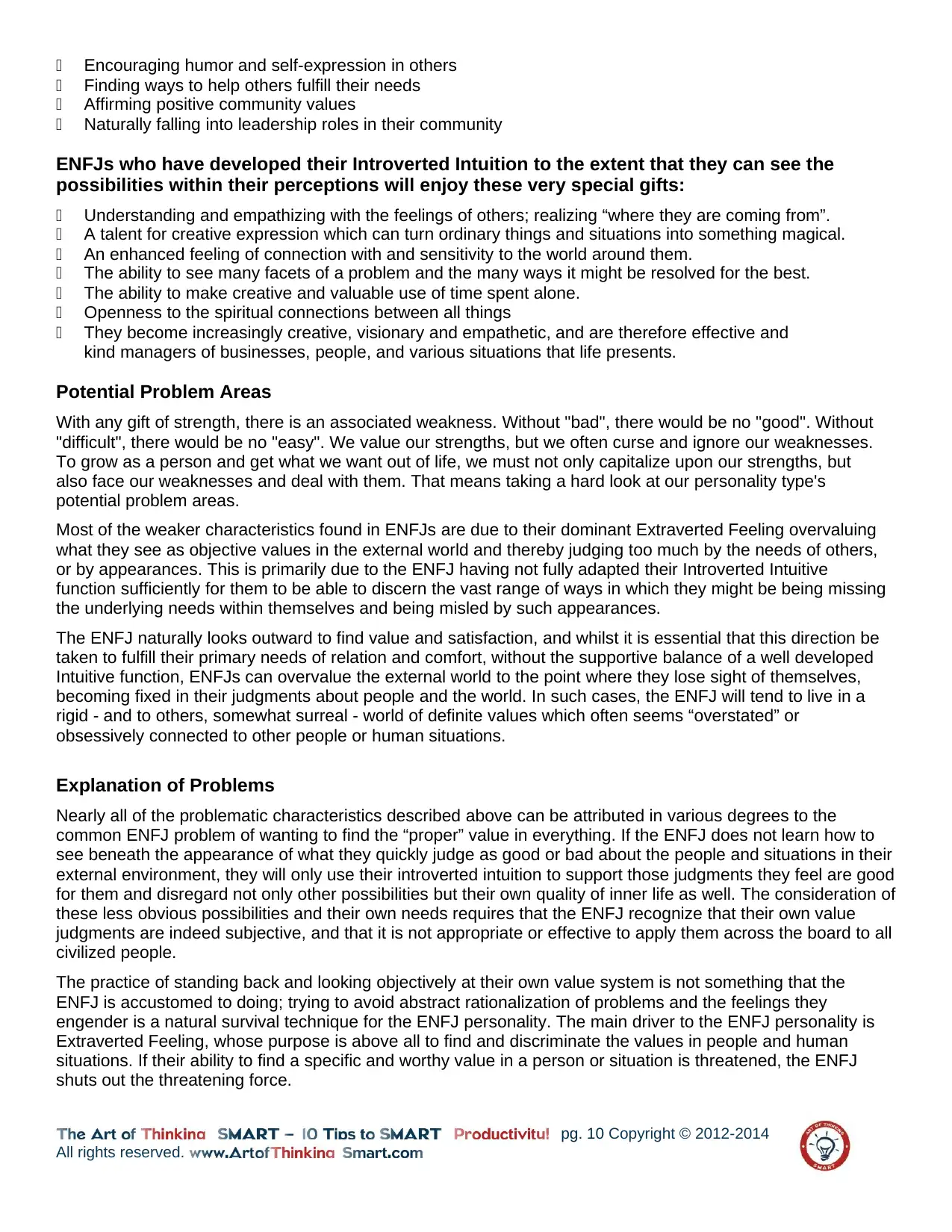
Encouraging humor and self-expression in others
Finding ways to help others fulfill their needs
Affirming positive community values
Naturally falling into leadership roles in their community
ENFJs who have developed their Introverted Intuition to the extent that they can see the
possibilities within their perceptions will enjoy these very special gifts:
Understanding and empathizing with the feelings of others; realizing “where they are coming from”.
A talent for creative expression which can turn ordinary things and situations into something magical.
An enhanced feeling of connection with and sensitivity to the world around them.
The ability to see many facets of a problem and the many ways it might be resolved for the best.
The ability to make creative and valuable use of time spent alone.
Openness to the spiritual connections between all things
They become increasingly creative, visionary and empathetic, and are therefore effective and
kind managers of businesses, people, and various situations that life presents.
Potential Problem Areas
With any gift of strength, there is an associated weakness. Without "bad", there would be no "good". Without
"difficult", there would be no "easy". We value our strengths, but we often curse and ignore our weaknesses.
To grow as a person and get what we want out of life, we must not only capitalize upon our strengths, but
also face our weaknesses and deal with them. That means taking a hard look at our personality type's
potential problem areas.
Most of the weaker characteristics found in ENFJs are due to their dominant Extraverted Feeling overvaluing
what they see as objective values in the external world and thereby judging too much by the needs of others,
or by appearances. This is primarily due to the ENFJ having not fully adapted their Introverted Intuitive
function sufficiently for them to be able to discern the vast range of ways in which they might be being missing
the underlying needs within themselves and being misled by such appearances.
The ENFJ naturally looks outward to find value and satisfaction, and whilst it is essential that this direction be
taken to fulfill their primary needs of relation and comfort, without the supportive balance of a well developed
Intuitive function, ENFJs can overvalue the external world to the point where they lose sight of themselves,
becoming fixed in their judgments about people and the world. In such cases, the ENFJ will tend to live in a
rigid - and to others, somewhat surreal - world of definite values which often seems “overstated” or
obsessively connected to other people or human situations.
Explanation of Problems
Nearly all of the problematic characteristics described above can be attributed in various degrees to the
common ENFJ problem of wanting to find the “proper” value in everything. If the ENFJ does not learn how to
see beneath the appearance of what they quickly judge as good or bad about the people and situations in their
external environment, they will only use their introverted intuition to support those judgments they feel are good
for them and disregard not only other possibilities but their own quality of inner life as well. The consideration of
these less obvious possibilities and their own needs requires that the ENFJ recognize that their own value
judgments are indeed subjective, and that it is not appropriate or effective to apply them across the board to all
civilized people.
The practice of standing back and looking objectively at their own value system is not something that the
ENFJ is accustomed to doing; trying to avoid abstract rationalization of problems and the feelings they
engender is a natural survival technique for the ENFJ personality. The main driver to the ENFJ personality is
Extraverted Feeling, whose purpose is above all to find and discriminate the values in people and human
situations. If their ability to find a specific and worthy value in a person or situation is threatened, the ENFJ
shuts out the threatening force.
pg. 10 Copyright © 2012-2014
All rights reserved.
Finding ways to help others fulfill their needs
Affirming positive community values
Naturally falling into leadership roles in their community
ENFJs who have developed their Introverted Intuition to the extent that they can see the
possibilities within their perceptions will enjoy these very special gifts:
Understanding and empathizing with the feelings of others; realizing “where they are coming from”.
A talent for creative expression which can turn ordinary things and situations into something magical.
An enhanced feeling of connection with and sensitivity to the world around them.
The ability to see many facets of a problem and the many ways it might be resolved for the best.
The ability to make creative and valuable use of time spent alone.
Openness to the spiritual connections between all things
They become increasingly creative, visionary and empathetic, and are therefore effective and
kind managers of businesses, people, and various situations that life presents.
Potential Problem Areas
With any gift of strength, there is an associated weakness. Without "bad", there would be no "good". Without
"difficult", there would be no "easy". We value our strengths, but we often curse and ignore our weaknesses.
To grow as a person and get what we want out of life, we must not only capitalize upon our strengths, but
also face our weaknesses and deal with them. That means taking a hard look at our personality type's
potential problem areas.
Most of the weaker characteristics found in ENFJs are due to their dominant Extraverted Feeling overvaluing
what they see as objective values in the external world and thereby judging too much by the needs of others,
or by appearances. This is primarily due to the ENFJ having not fully adapted their Introverted Intuitive
function sufficiently for them to be able to discern the vast range of ways in which they might be being missing
the underlying needs within themselves and being misled by such appearances.
The ENFJ naturally looks outward to find value and satisfaction, and whilst it is essential that this direction be
taken to fulfill their primary needs of relation and comfort, without the supportive balance of a well developed
Intuitive function, ENFJs can overvalue the external world to the point where they lose sight of themselves,
becoming fixed in their judgments about people and the world. In such cases, the ENFJ will tend to live in a
rigid - and to others, somewhat surreal - world of definite values which often seems “overstated” or
obsessively connected to other people or human situations.
Explanation of Problems
Nearly all of the problematic characteristics described above can be attributed in various degrees to the
common ENFJ problem of wanting to find the “proper” value in everything. If the ENFJ does not learn how to
see beneath the appearance of what they quickly judge as good or bad about the people and situations in their
external environment, they will only use their introverted intuition to support those judgments they feel are good
for them and disregard not only other possibilities but their own quality of inner life as well. The consideration of
these less obvious possibilities and their own needs requires that the ENFJ recognize that their own value
judgments are indeed subjective, and that it is not appropriate or effective to apply them across the board to all
civilized people.
The practice of standing back and looking objectively at their own value system is not something that the
ENFJ is accustomed to doing; trying to avoid abstract rationalization of problems and the feelings they
engender is a natural survival technique for the ENFJ personality. The main driver to the ENFJ personality is
Extraverted Feeling, whose purpose is above all to find and discriminate the values in people and human
situations. If their ability to find a specific and worthy value in a person or situation is threatened, the ENFJ
shuts out the threatening force.
pg. 10 Copyright © 2012-2014
All rights reserved.
Paraphrase This Document
Need a fresh take? Get an instant paraphrase of this document with our AI Paraphraser
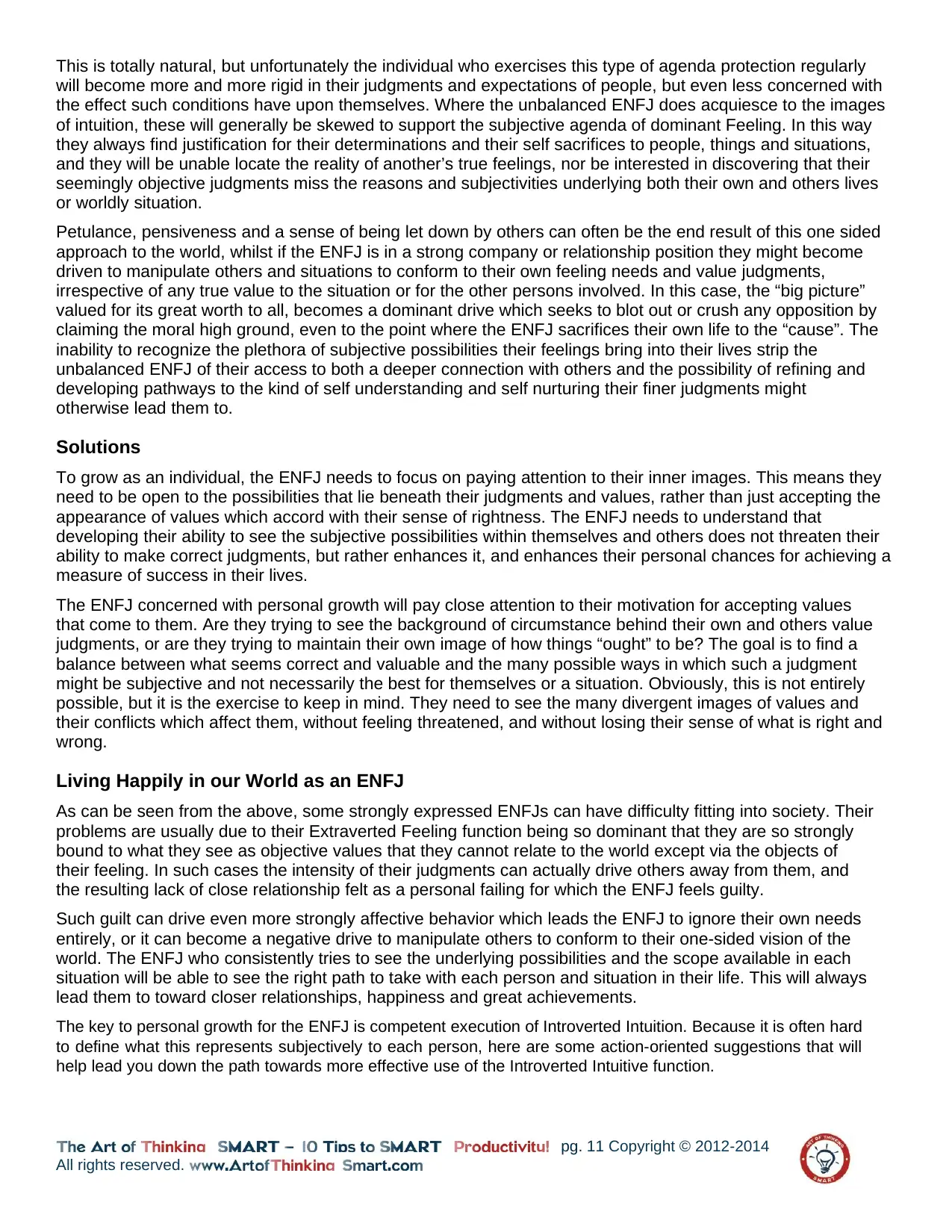
This is totally natural, but unfortunately the individual who exercises this type of agenda protection regularly
will become more and more rigid in their judgments and expectations of people, but even less concerned with
the effect such conditions have upon themselves. Where the unbalanced ENFJ does acquiesce to the images
of intuition, these will generally be skewed to support the subjective agenda of dominant Feeling. In this way
they always find justification for their determinations and their self sacrifices to people, things and situations,
and they will be unable locate the reality of another’s true feelings, nor be interested in discovering that their
seemingly objective judgments miss the reasons and subjectivities underlying both their own and others lives
or worldly situation.
Petulance, pensiveness and a sense of being let down by others can often be the end result of this one sided
approach to the world, whilst if the ENFJ is in a strong company or relationship position they might become
driven to manipulate others and situations to conform to their own feeling needs and value judgments,
irrespective of any true value to the situation or for the other persons involved. In this case, the “big picture”
valued for its great worth to all, becomes a dominant drive which seeks to blot out or crush any opposition by
claiming the moral high ground, even to the point where the ENFJ sacrifices their own life to the “cause”. The
inability to recognize the plethora of subjective possibilities their feelings bring into their lives strip the
unbalanced ENFJ of their access to both a deeper connection with others and the possibility of refining and
developing pathways to the kind of self understanding and self nurturing their finer judgments might
otherwise lead them to.
Solutions
To grow as an individual, the ENFJ needs to focus on paying attention to their inner images. This means they
need to be open to the possibilities that lie beneath their judgments and values, rather than just accepting the
appearance of values which accord with their sense of rightness. The ENFJ needs to understand that
developing their ability to see the subjective possibilities within themselves and others does not threaten their
ability to make correct judgments, but rather enhances it, and enhances their personal chances for achieving a
measure of success in their lives.
The ENFJ concerned with personal growth will pay close attention to their motivation for accepting values
that come to them. Are they trying to see the background of circumstance behind their own and others value
judgments, or are they trying to maintain their own image of how things “ought” to be? The goal is to find a
balance between what seems correct and valuable and the many possible ways in which such a judgment
might be subjective and not necessarily the best for themselves or a situation. Obviously, this is not entirely
possible, but it is the exercise to keep in mind. They need to see the many divergent images of values and
their conflicts which affect them, without feeling threatened, and without losing their sense of what is right and
wrong.
Living Happily in our World as an ENFJ
As can be seen from the above, some strongly expressed ENFJs can have difficulty fitting into society. Their
problems are usually due to their Extraverted Feeling function being so dominant that they are so strongly
bound to what they see as objective values that they cannot relate to the world except via the objects of
their feeling. In such cases the intensity of their judgments can actually drive others away from them, and
the resulting lack of close relationship felt as a personal failing for which the ENFJ feels guilty.
Such guilt can drive even more strongly affective behavior which leads the ENFJ to ignore their own needs
entirely, or it can become a negative drive to manipulate others to conform to their one-sided vision of the
world. The ENFJ who consistently tries to see the underlying possibilities and the scope available in each
situation will be able to see the right path to take with each person and situation in their life. This will always
lead them to toward closer relationships, happiness and great achievements.
The key to personal growth for the ENFJ is competent execution of Introverted Intuition. Because it is often hard
to define what this represents subjectively to each person, here are some action-oriented suggestions that will
help lead you down the path towards more effective use of the Introverted Intuitive function.
pg. 11 Copyright © 2012-2014
All rights reserved.
will become more and more rigid in their judgments and expectations of people, but even less concerned with
the effect such conditions have upon themselves. Where the unbalanced ENFJ does acquiesce to the images
of intuition, these will generally be skewed to support the subjective agenda of dominant Feeling. In this way
they always find justification for their determinations and their self sacrifices to people, things and situations,
and they will be unable locate the reality of another’s true feelings, nor be interested in discovering that their
seemingly objective judgments miss the reasons and subjectivities underlying both their own and others lives
or worldly situation.
Petulance, pensiveness and a sense of being let down by others can often be the end result of this one sided
approach to the world, whilst if the ENFJ is in a strong company or relationship position they might become
driven to manipulate others and situations to conform to their own feeling needs and value judgments,
irrespective of any true value to the situation or for the other persons involved. In this case, the “big picture”
valued for its great worth to all, becomes a dominant drive which seeks to blot out or crush any opposition by
claiming the moral high ground, even to the point where the ENFJ sacrifices their own life to the “cause”. The
inability to recognize the plethora of subjective possibilities their feelings bring into their lives strip the
unbalanced ENFJ of their access to both a deeper connection with others and the possibility of refining and
developing pathways to the kind of self understanding and self nurturing their finer judgments might
otherwise lead them to.
Solutions
To grow as an individual, the ENFJ needs to focus on paying attention to their inner images. This means they
need to be open to the possibilities that lie beneath their judgments and values, rather than just accepting the
appearance of values which accord with their sense of rightness. The ENFJ needs to understand that
developing their ability to see the subjective possibilities within themselves and others does not threaten their
ability to make correct judgments, but rather enhances it, and enhances their personal chances for achieving a
measure of success in their lives.
The ENFJ concerned with personal growth will pay close attention to their motivation for accepting values
that come to them. Are they trying to see the background of circumstance behind their own and others value
judgments, or are they trying to maintain their own image of how things “ought” to be? The goal is to find a
balance between what seems correct and valuable and the many possible ways in which such a judgment
might be subjective and not necessarily the best for themselves or a situation. Obviously, this is not entirely
possible, but it is the exercise to keep in mind. They need to see the many divergent images of values and
their conflicts which affect them, without feeling threatened, and without losing their sense of what is right and
wrong.
Living Happily in our World as an ENFJ
As can be seen from the above, some strongly expressed ENFJs can have difficulty fitting into society. Their
problems are usually due to their Extraverted Feeling function being so dominant that they are so strongly
bound to what they see as objective values that they cannot relate to the world except via the objects of
their feeling. In such cases the intensity of their judgments can actually drive others away from them, and
the resulting lack of close relationship felt as a personal failing for which the ENFJ feels guilty.
Such guilt can drive even more strongly affective behavior which leads the ENFJ to ignore their own needs
entirely, or it can become a negative drive to manipulate others to conform to their one-sided vision of the
world. The ENFJ who consistently tries to see the underlying possibilities and the scope available in each
situation will be able to see the right path to take with each person and situation in their life. This will always
lead them to toward closer relationships, happiness and great achievements.
The key to personal growth for the ENFJ is competent execution of Introverted Intuition. Because it is often hard
to define what this represents subjectively to each person, here are some action-oriented suggestions that will
help lead you down the path towards more effective use of the Introverted Intuitive function.
pg. 11 Copyright © 2012-2014
All rights reserved.
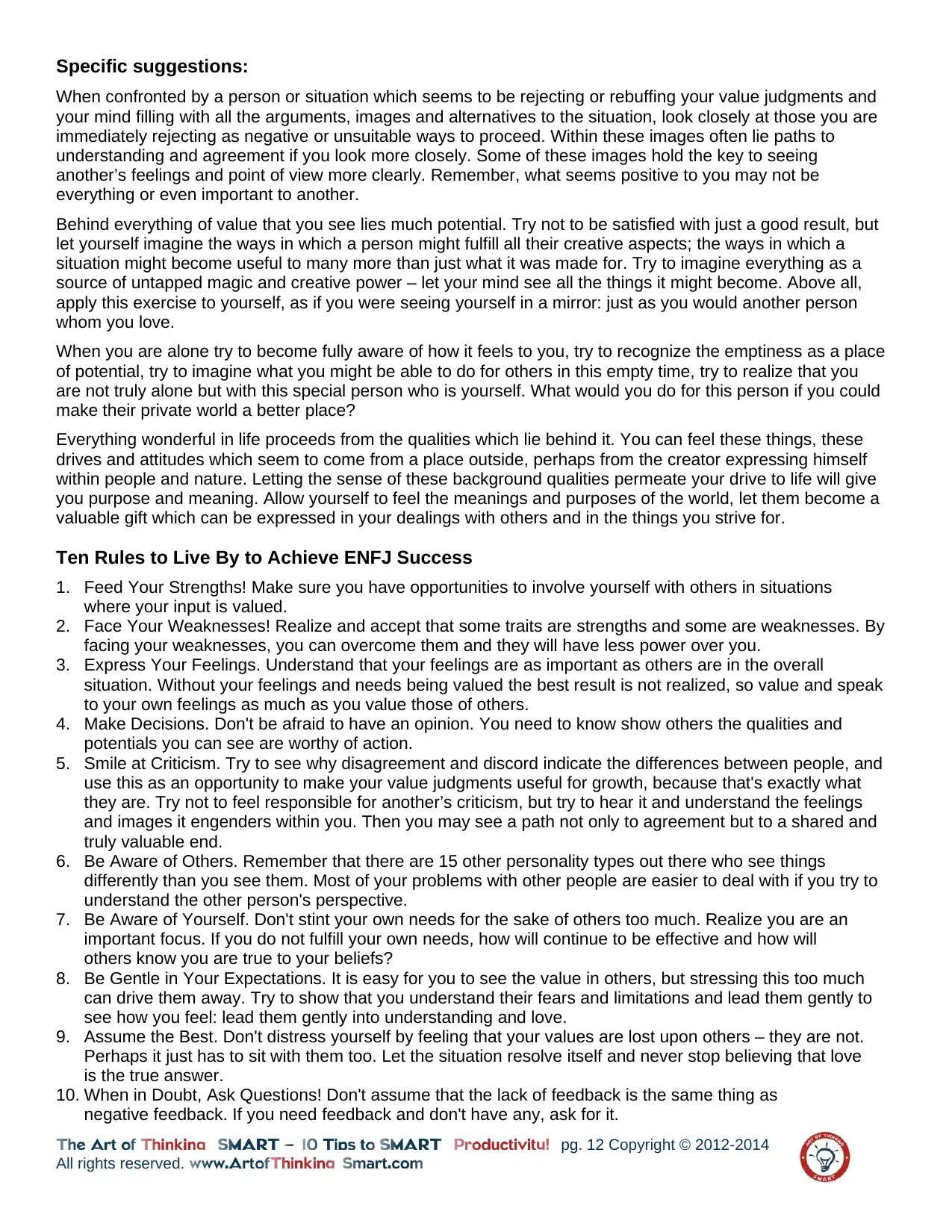
Specific suggestions:
When confronted by a person or situation which seems to be rejecting or rebuffing your value judgments and
your mind filling with all the arguments, images and alternatives to the situation, look closely at those you are
immediately rejecting as negative or unsuitable ways to proceed. Within these images often lie paths to
understanding and agreement if you look more closely. Some of these images hold the key to seeing
another’s feelings and point of view more clearly. Remember, what seems positive to you may not be
everything or even important to another.
Behind everything of value that you see lies much potential. Try not to be satisfied with just a good result, but
let yourself imagine the ways in which a person might fulfill all their creative aspects; the ways in which a
situation might become useful to many more than just what it was made for. Try to imagine everything as a
source of untapped magic and creative power – let your mind see all the things it might become. Above all,
apply this exercise to yourself, as if you were seeing yourself in a mirror: just as you would another person
whom you love.
When you are alone try to become fully aware of how it feels to you, try to recognize the emptiness as a place
of potential, try to imagine what you might be able to do for others in this empty time, try to realize that you
are not truly alone but with this special person who is yourself. What would you do for this person if you could
make their private world a better place?
Everything wonderful in life proceeds from the qualities which lie behind it. You can feel these things, these
drives and attitudes which seem to come from a place outside, perhaps from the creator expressing himself
within people and nature. Letting the sense of these background qualities permeate your drive to life will give
you purpose and meaning. Allow yourself to feel the meanings and purposes of the world, let them become a
valuable gift which can be expressed in your dealings with others and in the things you strive for.
Ten Rules to Live By to Achieve ENFJ Success
1. Feed Your Strengths! Make sure you have opportunities to involve yourself with others in situations
where your input is valued.
2. Face Your Weaknesses! Realize and accept that some traits are strengths and some are weaknesses. By
facing your weaknesses, you can overcome them and they will have less power over you.
3. Express Your Feelings. Understand that your feelings are as important as others are in the overall
situation. Without your feelings and needs being valued the best result is not realized, so value and speak
to your own feelings as much as you value those of others.
4. Make Decisions. Don't be afraid to have an opinion. You need to know show others the qualities and
potentials you can see are worthy of action.
5. Smile at Criticism. Try to see why disagreement and discord indicate the differences between people, and
use this as an opportunity to make your value judgments useful for growth, because that's exactly what
they are. Try not to feel responsible for another’s criticism, but try to hear it and understand the feelings
and images it engenders within you. Then you may see a path not only to agreement but to a shared and
truly valuable end.
6. Be Aware of Others. Remember that there are 15 other personality types out there who see things
differently than you see them. Most of your problems with other people are easier to deal with if you try to
understand the other person's perspective.
7. Be Aware of Yourself. Don't stint your own needs for the sake of others too much. Realize you are an
important focus. If you do not fulfill your own needs, how will continue to be effective and how will
others know you are true to your beliefs?
8. Be Gentle in Your Expectations. It is easy for you to see the value in others, but stressing this too much
can drive them away. Try to show that you understand their fears and limitations and lead them gently to
see how you feel: lead them gently into understanding and love.
9. Assume the Best. Don't distress yourself by feeling that your values are lost upon others – they are not.
Perhaps it just has to sit with them too. Let the situation resolve itself and never stop believing that love
is the true answer.
10. When in Doubt, Ask Questions! Don't assume that the lack of feedback is the same thing as
negative feedback. If you need feedback and don't have any, ask for it.
pg. 12 Copyright © 2012-2014
All rights reserved.
When confronted by a person or situation which seems to be rejecting or rebuffing your value judgments and
your mind filling with all the arguments, images and alternatives to the situation, look closely at those you are
immediately rejecting as negative or unsuitable ways to proceed. Within these images often lie paths to
understanding and agreement if you look more closely. Some of these images hold the key to seeing
another’s feelings and point of view more clearly. Remember, what seems positive to you may not be
everything or even important to another.
Behind everything of value that you see lies much potential. Try not to be satisfied with just a good result, but
let yourself imagine the ways in which a person might fulfill all their creative aspects; the ways in which a
situation might become useful to many more than just what it was made for. Try to imagine everything as a
source of untapped magic and creative power – let your mind see all the things it might become. Above all,
apply this exercise to yourself, as if you were seeing yourself in a mirror: just as you would another person
whom you love.
When you are alone try to become fully aware of how it feels to you, try to recognize the emptiness as a place
of potential, try to imagine what you might be able to do for others in this empty time, try to realize that you
are not truly alone but with this special person who is yourself. What would you do for this person if you could
make their private world a better place?
Everything wonderful in life proceeds from the qualities which lie behind it. You can feel these things, these
drives and attitudes which seem to come from a place outside, perhaps from the creator expressing himself
within people and nature. Letting the sense of these background qualities permeate your drive to life will give
you purpose and meaning. Allow yourself to feel the meanings and purposes of the world, let them become a
valuable gift which can be expressed in your dealings with others and in the things you strive for.
Ten Rules to Live By to Achieve ENFJ Success
1. Feed Your Strengths! Make sure you have opportunities to involve yourself with others in situations
where your input is valued.
2. Face Your Weaknesses! Realize and accept that some traits are strengths and some are weaknesses. By
facing your weaknesses, you can overcome them and they will have less power over you.
3. Express Your Feelings. Understand that your feelings are as important as others are in the overall
situation. Without your feelings and needs being valued the best result is not realized, so value and speak
to your own feelings as much as you value those of others.
4. Make Decisions. Don't be afraid to have an opinion. You need to know show others the qualities and
potentials you can see are worthy of action.
5. Smile at Criticism. Try to see why disagreement and discord indicate the differences between people, and
use this as an opportunity to make your value judgments useful for growth, because that's exactly what
they are. Try not to feel responsible for another’s criticism, but try to hear it and understand the feelings
and images it engenders within you. Then you may see a path not only to agreement but to a shared and
truly valuable end.
6. Be Aware of Others. Remember that there are 15 other personality types out there who see things
differently than you see them. Most of your problems with other people are easier to deal with if you try to
understand the other person's perspective.
7. Be Aware of Yourself. Don't stint your own needs for the sake of others too much. Realize you are an
important focus. If you do not fulfill your own needs, how will continue to be effective and how will
others know you are true to your beliefs?
8. Be Gentle in Your Expectations. It is easy for you to see the value in others, but stressing this too much
can drive them away. Try to show that you understand their fears and limitations and lead them gently to
see how you feel: lead them gently into understanding and love.
9. Assume the Best. Don't distress yourself by feeling that your values are lost upon others – they are not.
Perhaps it just has to sit with them too. Let the situation resolve itself and never stop believing that love
is the true answer.
10. When in Doubt, Ask Questions! Don't assume that the lack of feedback is the same thing as
negative feedback. If you need feedback and don't have any, ask for it.
pg. 12 Copyright © 2012-2014
All rights reserved.
⊘ This is a preview!⊘
Do you want full access?
Subscribe today to unlock all pages.

Trusted by 1+ million students worldwide
1 out of 110
Related Documents
Your All-in-One AI-Powered Toolkit for Academic Success.
+13062052269
info@desklib.com
Available 24*7 on WhatsApp / Email
![[object Object]](/_next/static/media/star-bottom.7253800d.svg)
Unlock your academic potential
Copyright © 2020–2026 A2Z Services. All Rights Reserved. Developed and managed by ZUCOL.





